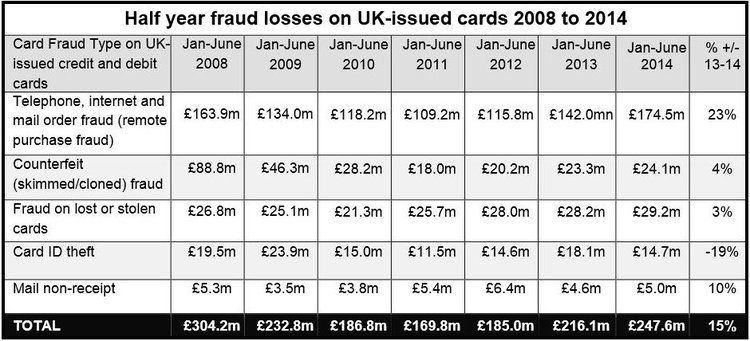In the first six months of 2014, online banking fraud jumped 71% in the UK, says Financial Fraud Action UK (FFA UK), an industry body, in a new report. In H1 2014, online fraud reached ₤29.3 million ($47.6 million).
Despite more secure log-in processes, banks appear to be fighting a losing battle against fraudsters in Britain.
Overall losses on UK cards (online and offline) from fraud between January and June this year totaled ₤247.6 million ($402.49 million), fifteen percent higher than during the same period in 2013.
Fraud represents 0.074% of money spent using cards in the UK today (7.4p of every ₤100), the same proportion as last year.
FFA UK says con-merchants have been succeeding in getting victims to reveal their online log-in details and personal data by making phone calls pretending to be bank employees investigating fraud.
Losses on remote banking fraud from January to June 2014 increased by 59% to ₤35.9 million ($58.36 million), of which:
- ₤29.3 million came from online banking fraud, a 71% increase on last year,
- ₤6.6 million came from telephone banking fraud, 20% higher than last year.
Online banking refers to paying bills, making transfers, checking one’s account, setting up payment schedules, all on the internet, rather than going to the branch or sending surface-mail letters.
Criminals prefer business accounts
The report suggests fraudsters are targeting business accounts because they can steal more money in each transaction.
Losses due to remote card purchases – those made by mail order, over the telephone or online – increased by 23% in the first six months of this year to ₤174.5 million. Within this total, e-commerce fraud loss totaled about ₤110 million.
Much of the increase is because people are shopping online more this year, the authors pointed out.
FFA UK wrote:
“While significant, this rise needs to be viewed in context of the increase in Internet shopping by British consumers, with spending up from an estimated ₤40.5 billion in the first half of 2013 to ₤47 billion in the same period in 2014, according to IMRG (Interactive Media in Retail Group). Card payments are the main driver of online spending growth as they provide the most effective way to pay online.”
(Source: FFA UK)
Vishing, a growing problem
Vishing, also known as voice fishing, occurs when somebody receives a telephone call from an identify thief pretending to be from their bank.
Typically, they call using an automated system which leaves a message informing the customer there is something wrong with his or her account or ATM card. They are instructed to call a phone number or visit a web page, which asks for personal account information to ‘verify their identity’. Many customers fall for this and provide their account details, which is then used to steal their money.
In some cases, the fraudster on the telephone arranges for a ‘bank courier’ to come and pick up the customer’s card from his/her house.
As soon as a person’s details have been compromised, they are used to commit fraud through online shopping or telephone/online banking. Fraudsters tend to use retailers that do not have adequate Internet shopping protections.
Too many people too trusting: According to research, 25% of customers who are telephoned do not challenge the identity of the cold-caller (the figure is 34% for young adults aged 18 to 24 years).
FFA UK urges people to remember that their bank will never:
- Call asking for their 4-digit PIN number or full online or telephone banking security codes,
- ask them to withdraw money, hand it over, or transfer money to another account, “even if they say the account is in your name,”
- come to their homes to collect their cash, check book or payment card.
Computer viruses
FFA UK says criminals use computer viruses to grab customers’ personal and financial data, which is then used to steal their money.
In August, the UK’s National Crime Agency urged customers to download and update their security software. You can download it free-of-charge from your banks’ website.
FFA quotes Detective Chief Inspector Perry Stokes, head the ‘Dedicated Cheque and Plastic Crime Unit’ in the UK, who said:
“Be very suspicious of phone calls, texts or emails which come out of the blue asking for personal or financial details, regardless of who they claim to represent.”
“Be aware of the warning signs: your bank will never ask you for your 4-digit PIN, to transfer or withdraw money, or to give your card to a courier. We are asking members of the public to pass this information on to any family and friends who may be unaware, and echo calls made last week by the Commissioner of City of London Police for a national awareness-raising campaign led by the government.”
Barclays unveils Biometric Reader
Earlier this month, British banking giant Barclays unveiled its Biometric Reader that uses finger-vein authentication technology.
Customers log into their bank accounts by placing their finger in the device, without any need for passwords or authentication codes.
The device is a partnership between Barclays and Hitachi Europe Ltd., and is aimed at combating fraud. It will be available to corporate customers initially.
Video – Vishing, the growing telephone scam
In this video, Detective Chief Inspector Dave Carter talks about ‘vishing’, what it is, and how to protect yourself.

